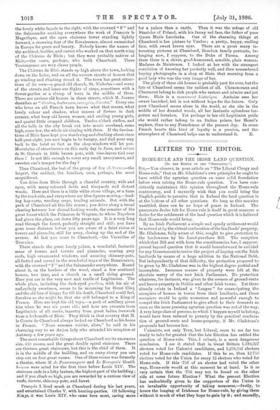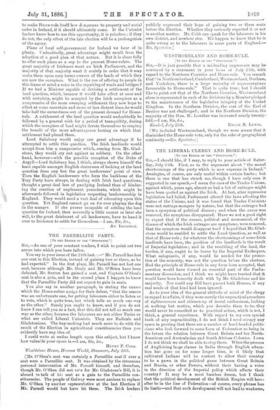LETTERS TO THE EDITOR.
HOME-RULE AND THE IRISH LAND QUESTION. [to THE EDITOR OF THE " SPECTATOR." SIR,—You observe, in your article on "The Liberal Clergy and Home-rule," that on Mr. Gladstone's own principles he ought to- have settled the agrarian question on some solid foundation
before even raising the Home-rule question. You have con- sistently maintained this opinion throughout the Home-rule controversy, and I earnestly wish that you could bring the English public to perceive that in Ireland the land question is at the bottom of all other questions. So long as this remains- unsettled, there can be no hope of peace in Ireland. The passionate desire felt for Home-rule is itself in great measure a desire for the settlement of the land question which it is believed that Home-rule would bring.
By an Irish Parliament a simple and speedy settlement would- be arrived at by the virtual confiscation of the landlords' property., Mr. Gladstone, fully aware of this, sought to give protection to the landowners by his Land-purchase Bill. The reception which that Bill met with from the constituencies has, I suppose._ proved beyond question that it would henceforward be suicidal for any Government to revive the project of buying out the Irish- landlords by means of a huge addition to the National Debt. Bue independently of that difficulty, the protection proposed to- be given by Mr. Gladstone was in the highest degree partial and incomplete. Immense masses of property were left at the absolute mercy of the new Irish Parliament. No protection whatever, for instance, was given to the owners of ground-rents and house-property in Dublin and other Irish towns. Yet there- already exists in Ireland a "League" for emancipating the occupiers of houses in towns from their landlords, and these occupiers would be quite numerous and powerful enough to- compel the Irish Parliament to give effect to their demands as soon as the more pressing agrarian question was out of the way. A very large class of persons, to which I happen myself to belong,. would have been reduced to poverty by the practical confisca- tion of ground-rents and house-property, if Mr. Gladstone's proposals had become law.
Unionists, not only Tory, but Liberal, seem to me far too-
ready to take for granted that the late Election has settled the question. of Home-rule. This, I submit, is a most dangerous conclusion. I see it stated that in Great Britain 1,316,327 electors voted for Unionist candidates, and 1,238,34:2 electors voted for Home-rule candidates. If this be so, then 12'756 electors voted for the Union for every 12 electors who voted for Home-rule. If this /56 of an elector had voted the other way, Home-rule would at this moment be at hand. Is it so very certain that the /56 may not be found on the other aide at some future Election ? What the present Election has undoubtedly given to the supporters of the Union is an invaluable opportunity of taking measures,—firstly, to- lessen the longing of Irishmen for Home-rule, by giving them without it much of what they hope to gain by it ; and secondly,
to make Home-role itself less ding,erous to property and social .order in Ireland, if it should ultimately come. If the Unionist leaders know how to use this opportunity, it is priceless ; if they do not, the only effect of the late election will be a prolongation of the agony.
Plans of local self-government for Ireland we hear of in plenty. Undoubtedly, great advantage might result from the adoption of a good plan of that nature. But it is sheer folly to offer such plans as a sop to the present Home-rulers. The great majority of Irishmen want an Irish Parliament, and the majority of that majority want it mainly in order that it may make them upon easy terms owners of the lands of which they are now the occupiers. What is the use of offering to people in this frame of mind a voice in the repairing of roads and bridges ? If we had a Minister capable of devising a settlement of the land question, which, because it would take effect at once and with certainty, might be accepted by the Irish occupiers as a compromise of the more sweeping settlement they now hope to ,effect at some uncertain and more or less distant time, he would take half the earnestness out of the present demand for Home- rule. A settlement of the land question would undoubtedly be followed by a general wish for a period of tranquillity, during which the occupiers of land might devote themselves to reaping the benefit of the more advantageous footing on which that settlement had placed them.
Lord Salisbury would enjoy one great advantage if he attempted to settle this question. The Irish landlords would accept from him a compromise which, coming from Mr. Glad- stone, they would cry out against as robbery. On the other Land, however—with the possible exception of the Duke of Argyll—Lord Salisbury has, I think, always shown himself the least capable amongst English statesmen of looking at the land question from any but the great landowners' point of view. Then the English landowners who form the backbone of the Tory Party have always, in dealing with Irish land questions, thought a great deal less of pacifying Ireland than of hinder- ing the creation of unpleasant precedents, which might be afterwards followed in legislation respecting landownership in England. They would need a vast deal of educating upon this question. Yet England cannot go on for ever playing the dog in the manger. If she proves incapable of settling the land question for Ireland, then assuredly a little sooner or later she will, to the great detriment of all landowners, have to hand it over to Irishmen to settle for themselves.—I am, Sir, &c.,
AN IRISHMAN.



































 Previous page
Previous page